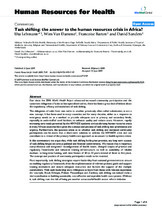| dc.description.abstract | Ever since the 2006 World Health Report advocated increased community participation and the systematic delegation of tasks to less-specialized cadres, there has been a great deal of debate about the expediency, efficacy and modalities of task shifting.
The delegation of tasks from one cadre to another, previously often called substitution, is not a new concept. It has been used in many countries and for many decades, either as a response to emergency needs or as a method to provide adequate care at primary and secondary levels, especially in understaffed rural facilities, to enhance quality and reduce costs. However, rapidly increasing care needs generated by the HIV/AIDS epidemic and accelerating human resource crises in many African countries have given the concept and practice of task shifting new prominence and urgency. Furthermore, the question arises as to whether task shifting and increased community participation can be more than a short-term solution to address the HIV/AIDS crisis and can contribute to a revival of the primary health care approach as an answer to health systems crises.
In this commentary we argue that, while task shifting holds great promise, any long-term success of task shifting hinges on serious political and financial commitments. We reason that it requires a comprehensive and integrated reconfiguration of health teams, changed scopes of practice and regulatory frameworks and enhanced training infrastructure, as well as availability of reliable medium- to long-term funding, with time frames of 20 to 30 years instead of three to five years. The concept and practice of community participation needs to be revisited.
Most importantly, task shifting strategies require leadership from national governments to ensure an enabling regulatory framework; drive the implementation of relevant policies; guide and support training institutions and ensure adequate resources; and harness the support of the multiple stakeholders. With such leadership and a willingness to learn from those with relevant experience (for example, Brazil, Ethiopia, Malawi, Mozambique and Zambia), task shifting can indeed make a vital contribution to building sustainable, cost-effective and equitable health care systems. Without it, task shifting runs the risk of being yet another unsuccessful health sector reform initiative. | en_US |

